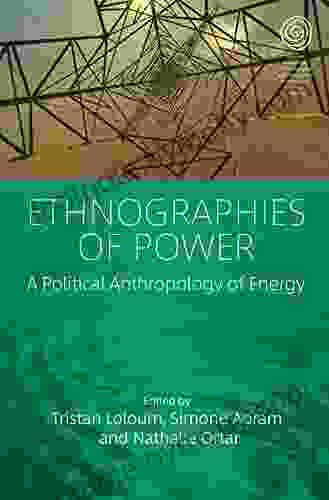Political Anthropology of Energy: Exploring the Nexus of Power, Culture, and Energy Systems

Energy, an indispensable force in our lives, is not merely a technical or economic matter but also a profound social and political phenomenon. It shapes societies, influences power dynamics, and is deeply intertwined with cultural practices. The field of political anthropology of energy delves into these intricate relationships, examining the interplay between energy systems, power, and culture.
Energy and Power
Energy is a critical source of power, both literally and metaphorically. Control over energy resources and technologies has historically been a key factor in determining political dominance and economic prosperity. The political anthropology of energy analyzes the ways in which different societies and groups access, distribute, and consume energy, and how these processes shape power relations.
4 out of 5
| Language | : | English |
| File size | : | 3782 KB |
| Text-to-Speech | : | Enabled |
| Screen Reader | : | Supported |
| Enhanced typesetting | : | Enabled |
| Word Wise | : | Enabled |
| Print length | : | 258 pages |
For instance, in many oil-rich countries, the control of energy wealth has led to the emergence of powerful elites and authoritarian regimes. Conversely, in regions where energy resources are scarce, access to energy can be a source of conflict and social inequality.
Energy and Culture
Energy practices are deeply embedded in cultural beliefs, values, and symbols. The political anthropology of energy examines how cultural understandings of energy influence the way people interact with energy systems. For example, in some cultures, energy is seen as a gift from the gods, while in others, it is viewed as a commodity to be exploited.
Cultural norms and practices also shape energy consumption patterns. In some societies, energy efficiency is highly valued, while in others, conspicuous energy consumption is a symbol of status and wealth.
Energy Transitions and Social Change
The political anthropology of energy also explores the social and political implications of energy transitions. As societies shift from one energy source to another, it can have profound effects on power structures, cultural practices, and social relations.
For example, the transition from fossil fuels to renewable energy sources has the potential to decentralize energy production and reduce the power of large energy corporations. It can also lead to new forms of social organization and community empowerment.
Case Studies and Examples
To illustrate the concepts discussed above, the political anthropology of energy often draws on case studies from around the world. These case studies provide concrete examples of how energy systems are shaped by and shape political and cultural processes.
- In Ecuador, the indigenous Kichwa people have resisted the construction of hydroelectric dams on their ancestral lands, arguing that these projects would disrupt their cultural and spiritual practices.
- In the United States, the Dakota Access Pipeline sparked protests from Native American tribes who argued that the pipeline violated their treaty rights and threatened their sacred lands.
- In South Africa, the post-apartheid government has implemented a renewable energy program aimed at addressing energy poverty and promoting sustainable development.
Policy Implications
The insights gained from the political anthropology of energy have important implications for policymakers. Understanding the social and political dimensions of energy systems can help policymakers develop more effective and equitable energy policies.
For example, policies that promote energy efficiency and renewable energy sources can help empower communities, reduce social inequality, and mitigate climate change.
The political anthropology of energy is a vibrant and growing field that offers valuable insights into the complex relationships between energy, power, culture, and society. By exploring these relationships, political anthropologists provide a unique perspective on energy issues and help us to develop more sustainable and equitable energy futures.
About the Author
Sarah Easa is an Associate Professor of Anthropology at the University of California, Berkeley. Her research focuses on the political anthropology of energy, environmental justice, and indigenous rights.
Book Details
Political Anthropology of Energy: Exploring the Nexus of Power, Culture, and Energy Systems
By Sarah Easa
Publisher: Berghahn Books
: 9781845459741
Pages: 240
4 out of 5
| Language | : | English |
| File size | : | 3782 KB |
| Text-to-Speech | : | Enabled |
| Screen Reader | : | Supported |
| Enhanced typesetting | : | Enabled |
| Word Wise | : | Enabled |
| Print length | : | 258 pages |
Do you want to contribute by writing guest posts on this blog?
Please contact us and send us a resume of previous articles that you have written.
 Book
Book Novel
Novel Page
Page Chapter
Chapter Text
Text Story
Story Genre
Genre Reader
Reader Library
Library Paperback
Paperback E-book
E-book Magazine
Magazine Newspaper
Newspaper Paragraph
Paragraph Sentence
Sentence Bookmark
Bookmark Shelf
Shelf Glossary
Glossary Bibliography
Bibliography Foreword
Foreword Preface
Preface Synopsis
Synopsis Annotation
Annotation Footnote
Footnote Manuscript
Manuscript Scroll
Scroll Codex
Codex Tome
Tome Bestseller
Bestseller Classics
Classics Library card
Library card Narrative
Narrative Biography
Biography Autobiography
Autobiography Memoir
Memoir Reference
Reference Encyclopedia
Encyclopedia David Jefferson
David Jefferson Deborah Fallows
Deborah Fallows Davonne Reaves
Davonne Reaves Kevin Mccarey
Kevin Mccarey David Hill
David Hill Patricia Brady
Patricia Brady David Rowlands
David Rowlands Cillyart Cindy M Bowles
Cillyart Cindy M Bowles Deb Howcroft
Deb Howcroft David A Wells
David A Wells Daryl Riersgard
Daryl Riersgard David Epstein
David Epstein David Andrew Snider
David Andrew Snider David Greig
David Greig Crystal Marie Fleming
Crystal Marie Fleming D T Vaughn
D T Vaughn Alison Weir
Alison Weir Ina Saltz
Ina Saltz Davide Napolitano
Davide Napolitano Deborah A Hwa Froelich
Deborah A Hwa Froelich
Light bulbAdvertise smarter! Our strategic ad space ensures maximum exposure. Reserve your spot today!
 Kazuo IshiguroFollow ·3.9k
Kazuo IshiguroFollow ·3.9k Jerome BlairFollow ·18.6k
Jerome BlairFollow ·18.6k Aubrey BlairFollow ·12.2k
Aubrey BlairFollow ·12.2k Earl WilliamsFollow ·3.4k
Earl WilliamsFollow ·3.4k Harvey HughesFollow ·8.1k
Harvey HughesFollow ·8.1k Enrique BlairFollow ·5.6k
Enrique BlairFollow ·5.6k Michael ChabonFollow ·19.1k
Michael ChabonFollow ·19.1k Billy FosterFollow ·16.1k
Billy FosterFollow ·16.1k

 Jayden Cox
Jayden CoxFaith Lies and the War on Terror: Exposing the Truth...
In the aftermath of the 9/11...

 Jack Powell
Jack PowellMad About the Trump Era: Mad Magazine 2024
The Trump...

 Warren Bell
Warren BellYou Got This: Tips for Women Who Want to Rock at Real...
Real estate...

 Ernest Cline
Ernest ClineThe Daring Life and Turbulent Times of the Original Girl...
: Embracing the Spirit of Adventure In...
4 out of 5
| Language | : | English |
| File size | : | 3782 KB |
| Text-to-Speech | : | Enabled |
| Screen Reader | : | Supported |
| Enhanced typesetting | : | Enabled |
| Word Wise | : | Enabled |
| Print length | : | 258 pages |
















